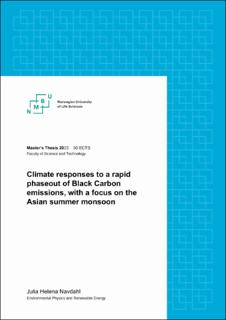| dc.description.abstract | The absorption of shortwave radiation by aerosols is predominantly caused by black carbon (BC), which can significantly affect atmospheric stability, circulation, and the hydrological cycle. Driven by concerns over air quality, public health, and global warming, a reduction in BC emissions is anticipated in the coming decades. This shift is of particular significance in South and East Asia, regions identified as aerosol hotspots, where large populations and the reliance on the Asian summer monsoon (ASM) make them especially susceptible to changes in aerosol dynamics.
This thesis comprehensively analyzes the climatic responses to a global phaseout in BC emissions under the SSP3-7.0 scenario. Utilizing simulations from three distinct climate models within the Coupled Model Intercomparison Project Phase 6 (CMIP6) experiment— UKESM1.0-LL, MIROC6, and MPI-ESM1.2-HAM—this study spans the period from 2015 to 2054 (and to 2094 for UKESM1.0-LL) to project global, regional, and seasonal anomalies. The focus is on examining the responses in Aerosol Absorption Optical Depth (AAOD), near- surface temperature, vertical mass flux, vertical air temperature, precipitation, and their interdependencies across each model.
The results reveal significant inter-model differences. MIROC and MPI-ESM exhibit weaker responses to BC emission reductions, aligning closely with the ASM’s typical behavior. In contrast, UKESM projects a robust decrease in precipitation over India, counter to expectations, attributed to reduced convective activity. This variance in responses emphasizes the challenges in climate modeling, mainly due to the poorly constrained nature of aerosol absorption and the complex mechanisms driving the Asian climate system. The thesis provides insights into the potential impact of climate policies aimed at mitigating BC emissions. | |
